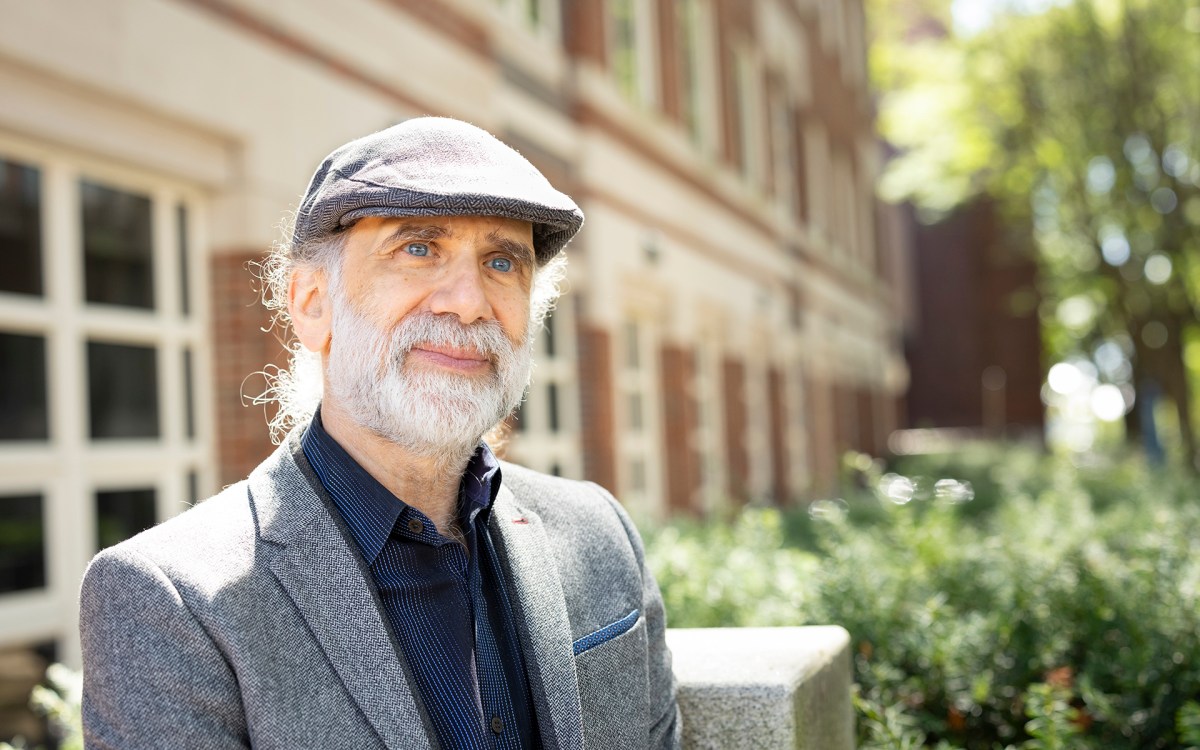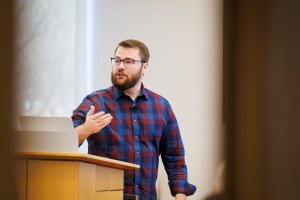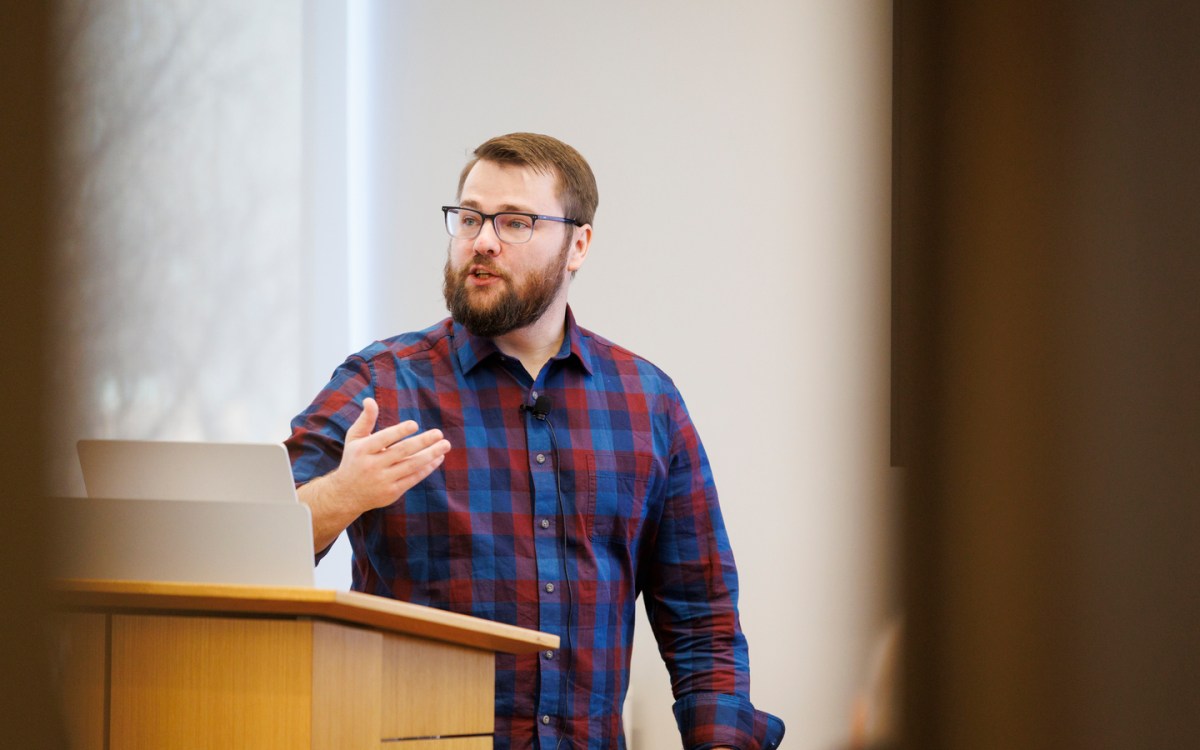Relief and research
Red Cross leader comes to Harvard with hopes of collaboration
With war raging in Syria, refugees suffering in South Sudan, and other trouble spots boiling around the world, Peter Maurer, president of the International Committee of the Red Cross, visited Harvard this week to talk with faculty at the School of Public Health and the Kennedy School about potential collaborations to help the ICRC in its humanitarian-assistance mission. The Gazette sat down with Maurer to talk about his goals for the visit and to get his thoughts on the world’s most urgent crises.
GAZETTE: What brings you to Harvard — what are you hoping to accomplish?
MAURER: In my former position as a Swiss diplomat, I worked with the School of Public Health and with the Kennedy School, so I’m coming back now as president of ICRC and because I learned [how] important the collaboration between diplomacy practice and the research community is. This is, of course, an enormous opportunity for ICRC, looking for more structured cooperation and collaboration with some of the institutes and institutions at Harvard that work in research areas which are critical for humanitarian assistance and protection, which is the core of ICRC’s mandate.
GAZETTE: Can you tell me a little bit more about the kind of research collaborations you’re interested in?
MAURER: If we look at what preoccupies us in the humanitarian environment today, it goes from technical to more strategic. If I start at technical, ICRC is an organization delivering water, sanitation, health services, and food to people in need and suffering from the negative impact of armed conflict. We are interested in research in health delivery, health systems; in the analysis of complex health situations; and the same for water, sanitation, food, and nutrition.
Negotiation of access is critical and negotiating skill is something that Harvard has been famous for for a long time. New technologies are of interest to us and how they impact the environment in which we operate and how we can use them in terms of improving our services.
And then there is the broader strategic debate which takes place at an institution like this one: understanding and interpreting the world in which we live, the complexities with which we are grappling. This is another reason to look for cooperation and collaboration with Harvard.
GAZETTE: Is there a specific entity within the University that you’re particularly interested in?
MAURER: Health and the respective health-related institutions from the School of Public Health, [such as] the Harvard Humanitarian Initiative, are critical. The second definitely is Kennedy School because of the negotiating capabilities and understanding of complex international environments in which we operate. But this is an exploratory mission and we are open to collaborate also with other Harvard- or Boston-based institutions.
GAZETTE: Do you have a sense of what form a collaboration would take?
MAURER: We are starting to have interns from Harvard joining ICRC in summer. That’s the first very concrete activity, but it can happen the other way round in terms of exchange. It can happen in issue-specific events, where we try to strategize on an issue. Why not grapple with providing health care to Syrians and the Syrian health crisis? It can cover other areas of geography, like the whole Sahel and sub-Saharan Africa region, which is a big area of instability. We are open-minded and will have to see what captures also the interests of [others].
GAZETTE: What would the timing be of any collaboration with Harvard?
MAURER: At ICRC, we have the culture of building operations bottom-up, so I think we shouldn’t spend too much time thinking about what cooperation should look like. I think we can relatively soon move into concrete activities, either in terms of issue- or context-specific debates, or in terms of exchange and cooperation between researchers and staffs. I hope to bubble up from this now onwards and not envisage a glorious future in three or five years. That’s too far away.
GAZETTE: Is this effort part of a changing business of humanitarianism? How is the humanitarian field changing more generally?
MAURER: The ICRC has already been in close contact with research institutions, but these contacts have been much more narrow and specific to the network of international humanitarian lawyers. The challenge is to expand this past practice of tapping into the network of international humanitarian law a step further, not at the price of contact with those lawyers, but to add other features of academic research to the network.
When you look back at 150 years history of ICRC, it’s a history of moving from charity to professionalism. And as we add complexities in the environment in which we operate, I think we have to take another leap forward in terms of improving the professional skills of our colleagues who are exposed to those complexities. This adds to the argument in favor of expanding cooperation and collaboration with research institutions.
GAZETTE: Does the ICRC still feel neutrality is an important quality for humanitarian organizations?
MAURER: The humanitarian community worldwide is deeply split on how best to respond to the challenges with which we are confronted. The larger part of organizations follow in the waters of the big U.N. ship, which is basically steering humanitarian action as an auxiliary of political solutions or strategic positions. ICRC has maintained that keeping the objectives separate and having humanitarian space as a stand-alone, with validity and an importance of itself, is of critical importance.
GAZETTE: Does that guarantee you greater access to trouble spots?
MAURER: It’s a question of access and, very frankly, also of security of our people. If we want to have access, impartiality and neutrality are critical. If we want to protect our colleagues who go into the most difficult situations of conflict worldwide, it’s of critical importance that we are perceived as being nonpolitical and genuinely oriented towards the needs of people. We are close to victims, close to perpetrators, and close to delivering assistance and protection according to needs and not to political agendas. So access is an important dimension, but it’s also our insurance policy for our staff in some of the most critical situations.
It’s not by chance that, if you look at the most critical situations, from rural Afghanistan to Southern Yemen to Central and Southern Somalia to some of the most remote places in the Congo, to remote places in Southern Sudan to [the] Central African Republic outside Bangui, it’s always the ICRC and ICRC delegates and maybe Doctors Without Borders and one or two other institutions there. And I think it’s important to be aware that, if we lose the perception of being a neutral and impartial actor, we lose critical ability to act.
GAZETTE: What are the places of greatest humanitarian need today and what are the places that aren’t getting the attention they need?
MAURER: In humanitarian action, there is always a difficult triangle to manage. On the one side, you have attention to humanitarian issues. On the other side, you have real assessments of need. And on the third side, you have money. And one of the challenges is always to bring money to needs and to keep it in sync with attention. What we normally find is that there is no balance between the three. You have high attention on certain conflicts, which are not necessarily the highest needs and you have big needs in places with no attention and no money. So I’m always hesitant to list places, because it depends on your perspective.
If you look at cruelty of warfare, Syria has an emblematic significance in today’s world. If you look at numbers of people living at the threshold of survival, Syria is not the worst of the crises with which we are confronted. We are at the present moment feeding more than 100,000 people … in South Sudan who don’t have anything and who die within days if humanitarian assistance is not provided. So depending on which lens you take, one or the other conflict has a different profile of needs, and again, I think one of the challenges of an organization like ICRC is to bring needs, attention, and money closer together.
Interview was edited for length and clarity.




